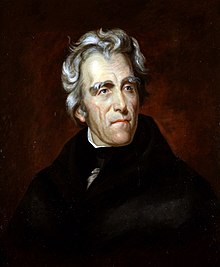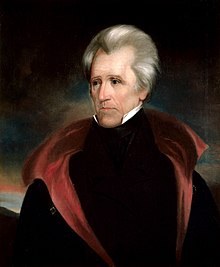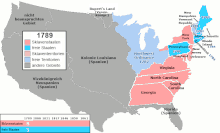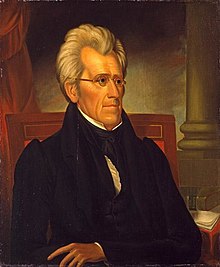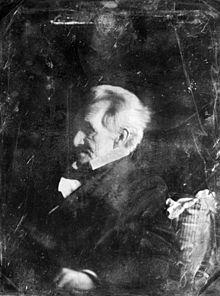Andrew Jackson
Andrew Jackson (born March 15, 1767 in the Waxhaws , † June 8, 1845 near Nashville , Tennessee ) was an American politician and the seventh President of the United States from 1829 to 1837 . He is also the founder of the US Democratic Party together with Martin Van Buren .
Jackson came from a very simple background and began to gain the reputation of his compatriots through his participation in the war of 1812 and later in various Indian campaigns . Politically, he first appeared as a senator and military governor of Florida . His fame as a military commander led him to run for president for the first time as a Democratic Republican in 1824 . Although he received a relative majority of votes in the Popular Vote and electors from a total of four candidates from the same party , it was not enough for the absolute majority required for victory on the Electoral Board, and the House of Representatives , through Henry Clay's mediation, appointed John Quincy Adams as President.
A little later he was preparing for the election of 1828 for a new application for the highest office of the state. During this time he devoted himself intensively to building up the newly founded Democratic Party, which he separated from the then Democratic-Republican Party. After an extremely fierce election campaign, he was able to confidently defeat Adams and take office in March 1829. In the fall of 1832 he was confirmed for a second term without any problems .
Jackson went down in US history as one of the formative presidents: On the one hand, he was the first president who did not come from the elite of the American War of Independence , on the other hand, he made extensive changes to the state organization during his reign. This includes the establishment of the spoils system and the break-up of the American National Bank , which, however, had a negative impact under his successor Van Buren during the economic crisis of 1837 . During his term of office the forcible expulsion of the “ five civilized Indian nations ” with countless fatalities also falls . After completing his presidency in 1837, Jackson retired into private life. Until his death in 1845, however, he remained an influential figure within the Democratic Party.
Life to the presidency
Childhood, youth and education
Andrew Jackson was born in the Waxhaws on March 15, 1767 ; then a disputed area between North and South Carolina . His parents, Andrew Jackson senior (* approx. 1730 - † February 1767) and Elizabeth "Betty" Hutchinson (* approx. 1740 - † November 1781), emigrated in 1765 from Carrickfergus in what is now Northern Ireland to the USA. Jackson's father died two months before he was born. Since Jackson was initially destined for a ministry at the will of his family, he was able to enjoy a basic education. Due to the War of Independence , this was no longer possible from the age of ten. With his mother and two brothers he was taken prisoner by the British for a time in 1781; one of his brothers did not survive the ordeal. His mother also died a little later.
Jackson had a poor upbringing and training and had worked for a lawyer since he was 18 . He was admitted to the practice in 1786 and settled in Nashville , Tennessee. From 1788 he was prosecutor for western North Carolina , that is, for the area of what will later become Tennessee. In 1791 he married Rachel Donelson Robards ; Since the divorce from her first husband had not yet taken place, they remarried in 1794. After becoming a member of the constituent assembly of the new US state of Tennessee, he was one of the first representatives of the state to serve in the US House of Representatives in 1796 and in the United States Senate the following year . From 1798 to 1804 he was a judge at the Tennessee Supreme Court . Conflicts with incumbent President Thomas Jefferson led to his temporary withdrawal from political life. Between 1805 and 1812 he ran his farm at the West Cabin . Jackson killed Charles Dickinson, a regionally known shooter, in a duel on May 30, 1806 , but was also seriously injured himself: A bullet pierced two ribs, narrowly missed the heart and remained stuck in the chest for life. Dickinson had slandered Jackson's wife, which led to the duel. Jackson continued to engage in frequent duels, and another gunshot wound resulted in permanent abdominal pain, probably from lead poisoning .
Military career
1812 Jackson received the supreme command of all militias of the State of Tennessee and drove the local Muskogee - Native to Florida . When the English threatened New Orleans in 1815 , Jackson was given command of the line troops there and was promoted to major general.
Jackson became a national hero, then only surpassed by George Washington, after he defeated the British in the Battle of New Orleans on January 8, 1815. Jackson and his opponents were not aware that the peace of Ghent had been concluded by then. His popularity rose when he defeated the Seminoles in the First Seminole War (1817/18).
Presidential election 1824
Jackson returned to political life in the early 1820s. He was named military governor of Florida, which had just been ceded by the Spanish, and was again US Senator for the state of Tennessee from 1823 to 1825 . In the presidential election of 1824 Jackson ran for the office of US president for the first time and achieved the most popular vote nationwide (41.3%). However, since this time a total of four politically heavyweight candidates from the Democratic Republican Party ran , none of the applicants managed to get the necessary majority of votes in the electoral body . According to the constitution, the American House of Representatives now had to elect the President and the Senate the Vice-President . When the fourth-placed candidate Henry Clay voted for John Quincy Adams , he was ultimately able to prevail and was elected president. Jackson accused both of corruption since Adams had appointed Clay Secretary of State. In this context, the name Jackson chose, Corrupt Bargain, became known.
As a result, the strongest party at the time split into the Democrats around Jackson and Van Buren and the National Republican Party around Adams.
The election of 1828
Four years after his defeat by John Quincy Adams, the newly founded Democratic Party put up Jackson for the first time as its own presidential candidate. At the first nomination congress in spring 1828 he was unanimously elected as a candidate. Jackson, who considered Adams' election illegitimate in 1824, began preparing for a new duel as early as 1825. This also included building up his new party. The election campaign against Adams, who ran for the National Republicans, was fought with extreme severity. Both adversaries and their parties did not save with serious personal attacks on the opponent. So the Democrats vilified the incumbent president as aloof and dishonorable. He also made the Indian resettlement a central election campaign issue. The white settlers' interest in Indian land, especially in the southern states, was possibly one of the main reasons for his election victory. The National Republican campaign denounced Jackson as obsessed with power; Adams also raised the fact that his wife Rachel was married once. Historians today agree that 1828 was one of the “dirtiest” election campaigns in American history. But the violent political disputes led to an unprecedented politicization of the population.
After the final result was determined in December 1828, Jackson was able to clearly defeat Adams with a share of 56 percent of the vote, who combined a little more than 43 percent. Jackson's victory in the Electoral College was also clear: 178 electors had been cast, Adams received 83 votes.
After his political triumph, Jackson suffered a serious personal setback on December 22, 1828 with the death of his wife. The newly elected president blamed his wife's death primarily on his political opponents, who had contributed to her death through their personal attacks on Rachel Jackson.
Presidency (1829–1837)
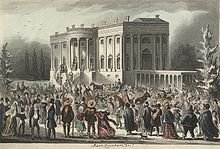
He assumed the office of president on March 4, 1829, according to the then legal regulation. Vice-president during his first term of office was John C. Calhoun , who had also served as Adams' deputy, but turned away from him. Andrew Jackson was the first president outside of the American Revolution circle . George Washington , John Adams , Thomas Jefferson , James Madison and James Monroe were recognized figures who fought in the American Revolutionary War and shaped the constitution of the United States , John Quincy Adams was the son of John Adams. The election of Andrew Jackson marked a break with the past. Jackson did not come from the great agrarian founding elite of the USA, but represented the petty-bourgeois interests of the new immigrants .
In the course of the petticoat affair , the Jackson cabinet was restructured in 1831 . With this affair began the growing estrangement between Jackson and his Vice President Calhoun.
In the presidential election of 1832 , Jackson successfully ran for re-election and began his second term in March 1833. He clearly defeated his political enemy, Senator Henry Clay , with a share of the vote of 54.7 percent and 219 electors. Clay, who ridiculed Jackson as "King Andrew" in his election campaign, received only 36.9 percent of the vote and 49 electorates as a candidate for the National Republicans. Another 7.8 percent and seven electors went to the anti-Masonic Party candidate William Wirt . In 16 of the then 23 states, the incumbent was able to win a majority of the votes. Jackson's former foreign minister and close confidante Martin Van Buren became the new vice president . The former Vice President John C. Calhoun, who disagreed with the President on many political issues, was not re-established by the Democratic Party. Calhoun then resigned in December 1832 shortly before the end of his term in office.
Economy and Infrastructure
The years of Jackson's presidency were characterized by far-reaching economic changes. Even the time before he came to power was marked by an unprecedented expansion of the infrastructure, especially roads and canals, later the railroad was added, which laid the foundation for industrialization . During this time, capitalist market forces prevailed in the United States in what historians now know as the market revolution. This was expressed in particular by the orientation of industry and agriculture on the world market .
Indian policy
Andrew Jackson was considered an "Indian hater" throughout his military and political career. In this he differs from the founding fathers of the USA, who had at least granted rights to the “five civilized nations” , and also from his direct predecessor John Quincy Adams .
During the British-American War of 1812, Jackson had already learned that the British had fought against the United States with Indian allies. This probably strengthened his attitude to deny the indigenous people equal rights and wherever possible to drive them out in favor of white settlers. After his victory as general in the Tennessee Militia over the Muskogee (Creek) at the Battle of Horseshoe Bend in 1814, he was appointed major general in the United States Army in May of that year . Later, in the Treaty of Fort Jackson , he forced the cession of much of the Indian land, including areas of Indians who had fought on the side of the United States.
1817-1818 Jackson invaded Florida , which was then under Spanish rule. As a justification, he gave the goal of capturing runaway black slaves who had fled to the Seminole tribe . The Seminoles were defeated and initially relocated to a reservation in South and Central Florida, from which they were later driven out.
During Jackson's presidency, the Senate and House of Representatives passed the Indian Removal Act in 1830 . Formally, the law only authorized him to negotiate the exchange of the Indian territories in the fertile south-eastern woodlands of the southern states for areas in the barren, arid Indian territory (today Oklahoma ). Jackson used this power of attorney, however, to enforce relocation treaties in which the Indians lost everything. If the elected chiefs refused, other, mostly illegitimate, representatives were negotiated. The resettlement itself resulted in innumerable deaths on the path of tears due to disease, poor administration, inadequate supplies and the complete lack of rights of the Indians . The only tribe that refused, the Seminoles in Florida, was almost annihilated in a war that lasted years and was extremely costly for the US military .
Slavery issue
Jackson looked at the issue of slavery in the United States not from an ethical but a political point of view, based on the Missouri Compromise of 1820. On the one hand he was an outspoken opponent of the abolitionists , on the other hand he rejected the view widespread among planters in the southern states that slavery was a moral institution of divine order. The latter and his approach in the nullification crisis brought him into disrepute among many slave owners for putting national unity above their interests. Jackson, who was himself a slave owner, ended up turning both northern abolitionists and radical southern slavery advocates against him. Overall, he saw in the anti-slavery movement an unconstitutional and provocative interference by the North in the internal affairs of the slave states and was concerned about the impact of this conflict on the American Union.
Nullification crisis
A significant event of his presidency was the nullification crisis of 1832/33. This was preceded by a political dispute with the state of South Carolina , which was dissatisfied with the customs policy of the federal government. On November 24, 1832, the state declared that it would be able to annul ("nullify") any displeasing customs laws of the government in Washington. This announcement came with a threat to withdraw from the United States if the federal government tried to enforce customs laws by force of arms. Jackson firmly denied this. He regards the conduct of South Carolina as unconstitutional . Encouraged by the fact that no other state was affiliated with South Carolina, the president asked Congress for a law that would allow it to enforce federal law in South Carolina, if necessary by force. The parliamentarians approved Jackson's request with a large majority, but a new customs law with lower tariffs was passed at the same time. The latter was intended as a compromise offer to the state. On March 2, 1833, Jackson signed both laws and the crisis was averted. Today, many historians positively rate the fact that Jackson resolutely opposed the idea of secession of a state in the course of the nullification crisis and thus preserved the unity of the country.
"Bank War"


In 1819, after Jackson saw the Bank of the United States' interest and credit policies drive American farmers into financial ruin, breaking up the bank became one of his key political concerns. His actions against the National Bank quickly became known as the Bank War (" Bank War "). After Jackson took office, he pushed this project forward. This soon led to sharp arguments with Senator Henry Clay and bank manager Nicholas Biddle ; Both Biddle and Clay were separated from Jackson by a mutual personal dislike. In the summer of 1832, when the election campaign between Jackson and Clay was already in full swing, the Senator decided to make a risky political move in which he hoped to decisively weaken the president. Clay brought a bill into Congress to prematurely renew the National Bank's license, which ran until 1836. The draft was approved in both chambers of Congress. However, Jackson saw through Clay's ambitions and vetoed the law on July 10, 1832 . In his statement of reasons, the president stated that he saw a considerable risk across the board for the citizens and for the economy of the country, since a quarter of the bank shares were already in foreign ownership. He also pointed out that "the rich and powerful have too often misused government measures for their selfish ends." Jackson saw the failure of a two-thirds majority in Congress to override the veto as a complete success. A few months later, Clay suffered another political setback with his clear election defeat against Jackson in the presidential election campaign. Within a few years Jackson had achieved his goal; in 1836 the National Bank was privatized. The president had previously urged the finance minister to distribute the federal government's gold reserves among the state banks.
Establishment of the "spoils system"
The establishment of the so-called spoils system in American politics goes back to Jackson's presidency. It describes the practice that the supporters of an election winner are rewarded with jobs in public administration. The spoils system is also an incentive for supporters to continue working for the election winner's party. The term is derived from Senator William L. Marcys saying "to the victor belong the spoils", in German about "the winner belongs to the spoils". Upon assuming office, President Jackson systematically rewarded his bearers and supporters with government agencies. He thought that the successful election by the people gave the victorious party the mandate to appoint state officials from among the ranks of its own party. Proponents of this practice stated that in this way citizens would be able to vote out those in the public service by voting out of the executive branch . Opponents of the spoils system replied that this system is prone to incompetence and unbridled corruption - and because ultimately supporters of the winner are appointed, this would contradict Republican ideology .
Foreign policy
The foreign policy played a minor role during Jackson's presidency. During his tenure, relations with France were briefly strained after the French refused to pay compensation for the looting of American ships in Napoleon's time, although this was agreed in a bilateral agreement in 1831. In 1835, after the British government also spoke out in favor of it, France paid off its debts to the US, thus settling the conflict.
Jackson early sympathized with an annexation of the Republic of Texas to the USA. Texas gained independence from Mexico in 1836 ; The condition was that Texas would not become part of the United States. The president delayed the recognition of Texas as a separate state at the end of his term in office in order to avoid debates on this topic in the election campaign of 1836. It was not until early March 1837, shortly before the end of his reign, that Jackson confirmed the recognition of Texas as a sovereign state. After his tenure ended, Jackson repeatedly spoke out in favor of joining the United States. This took place in 1845 and soon afterwards led to the war between the USA and Mexico.
Failed assassination attempt
Andrew Jackson was the first US president to be assassinated: On January 30, 1835, Jackson left the Capitol when the unemployed English painter Richard Lawrence pointed two pistols at him. Both pistols did not fire, however, and it is said that Jackson himself managed to beat the assassin with his walking stick. The insane perpetrator was later admitted to a psychiatric ward and was never charged with the assassination attempt.
End of the presidency
In 1836 Jackson decided against re-election for a third term and spoke out in favor of his deputy Martin Van Buren as his successor. After Van Buren had been unanimously nominated by the Democrats and had prevailed in the presidential election in 1836 , he replaced Jackson on March 4, 1837. At just under 70, Jackson was the oldest incumbent president to date. Jackson also remained the last president to be re-elected in office until Abraham Lincoln was re- elected in 1864 . However, after Lincoln had been assassinated in his second term, Ulysses S. Grant (1869–1877) was the next president to actually complete two full terms .
Recorded states
Two states were admitted to the United States during Andrew Jackson's presidency :
Appeals to the Supreme Court
Jackson appointed six judges to the US Supreme Court during his tenure as president :
- John McLean - 1830
- Henry Baldwin - 1830
- James Moore Wayne - 1835
- Roger Brooke Taney ( Chief Justice ) - 1836
- Philip Pendleton Barbour - 1836
- John Catron - 1837
Further appeals were made to lower federal courts.
Last years and death

After Jackson left the White House , he largely withdrew from politics. However, the economic crisis of 1837 had hit him hard financially. In 1840 he spoke out - in vain - for the re-election of his confidante and successor Martin Van Buren, who was defeated by the Whig candidate William Henry Harrison . Jackson watched Harrison's election victory with great concern after the newly elected president spoke out in favor of re-establishing the National Bank. But when Harrison died unexpectedly in April 1841, his successor, the previous Vice President John Tyler , blocked this project with his veto. After he was excluded from the Whig Party as a consequence, Jackson, who was still influential within the party, called on the Democrats to give former party member Tyler a friendly welcome. Although Tyler was non-party , he supported Jackson's request to admit Texas to the United States, which was completed in March 1845. Jackson previously supported the candidacy of Democrat James K. Polk in 1844 . Polk had been Speaker of the House of Representatives during the final stages of Jackson's presidency and had loyally supported Jackson's policies, whom he regarded as a role model. Another promising nomination by Martin Van Buren had previously been rejected by Jackson after he had spoken out against the annexation of the Republic of Texas. Jackson previously wrote to President John Tyler in a letter asking him to withdraw his candidacy for a Democratic splinter group in order to give Polk a better chance of winning an election against Jackson's political enemy Henry Clay , who after expulsion and further efforts, Tyler's government resigned Overthrowing Whig minister was also Tyler's enemy. In the summer of 1844, Tyler actually withdrew his application and supported Polk; he was then elected as the new president with a narrow majority. Jackson was only to see the first three months of his term in office.
Andrew Jackson died of heart failure on June 8, 1845 at the age of 78 and was buried near Nashville with his wife Rachel, who died in 1828 .
Aftermath
As in his lifetime, Andrew Jackson has a polarizing effect to this day . Today's critics are particularly negative about his restrictive Indian policy, which, in addition to displacement, led to numerous deaths. Some historians try to put this into perspective with the origin and era of Jackson. Jackson was guided here by various influences that he, like many of his contemporaries, could not escape from. His crisis management in the course of the nullification crisis finds a positive assessment in the historical context, as he successfully opposed the secession of a federal state and thus preserved the unity of the country. His presidency was particularly remembered for his success in dissolving the National Bank, which many historians see as the president's advocacy for the common people. Many historians and politicians later referred to Jackson's time as the Jacksonian Democracy . This was to characterize Jackson's rise from the common people to the highest office of the state as well as his advocacy of “the common man's cause” and thus the self-determination of the American people on the basis of democratic processes (the name Jacksonian Democracy is the only epoch in the History of the United States named after a person). His role in founding the Democratic Party is also of great historical importance.
Jacksonville , the most populous city in Florida , is named after Andrew Jackson. In addition, 22 counties bear his name.
Filmography
A biographical account of the lives of Andrew and Rachel Jackson is based on Irving Stone 's novel The President's Lady , which was released in 1953 with Susan Hayward , Charlton Heston , John McIntire and Carl Betz in the lead roles, directed by Henry Levin .
Others
- About 19 kilometers east of Nashville is the historic Hermitage . It was the residence of Andrew Jackson and is on US Route 70N . It was listed as a memorial by the NRHP in 1966 (NRHP ID 66000722).
- In 1805 Jackson was admitted to the Freemasonry Association. From 1822 to 1824 and 1839 he held the office of Grand Master of the Grand Lodge of Tennessee.
- Andrew Jackson is pictured on the $ 20 bill.
novel
- Irving Stone : Beyond Death. Novel. (The President's Lady). Translated by Margarete Längfeld. Droemer Knaur, Munich 1979 ISBN 3-426-19001-X (again German book club , 1980).
literature
- David S. Heidler, Jeanne T. Heidler: The Rise of Andrew Jackson: Myth, Manipulation, and the Making of Modern Politics. Basic Books, New York 2018, ISBN 978-0465097579 .
- Horst Dippel : Andrew Jackson 1829-1837: President of the democratic upheaval. In: Christof Mauch (Ed.): The American Presidents. 44 historical portraits from George Washington to Barack Obama. 6th, continued and updated edition. CH Beck, Munich 2013 [1. Edition 1995], ISBN 978-3-406-58742-9 , pp. 117-129, 474 f. [annotated bibliography].
- Jon Meacham: American Lion. Andrew Jackson in the White House. Random House, 2009 ( Pulitzer Prize for this book).
- HW Brands: Andrew Jackson. His Life and Times. Anchor, 2006, ISBN 1-4000-3072-2 .
- Sean Wilentz : Andrew Jackson (= The American Presidents Series, The 7th President. Eds. Arthur M. Schlesinger , Sean Wilentz). Times Books, New York 2005, ISBN 0-8050-6925-9 .
- Donald B. Cole: The Presidency of Andrew Jackson. University Print of Kansas, 1993, ISBN 0-7006-0961-X .
- James G. Barber (Ed.): Old Hickory. A life sketch of Andrew Jackson. National Portrait Gallery, Washington DC 1990, ISBN 0-295-97081-2 .
- Robert V. Remini: The Life of Andrew Jackson. Harper & Row, New York 1988, ISBN 0-06-015904-9 .
- Arthur M. Schlesinger, jr .: The Age of Jackson. Little, Brown, Boston 1988, ISBN 0-316-77343-3 .
Web links
- Andrew Jackson in the Biographical Directory of the United States Congress (English)
- Andrew Jackson in the nndb (English)
- American President: Andrew Jackson (1767-1845). Miller Center of Public Affairs of the University of Virginia (English, editor: Daniel Feller)
- The American Presidency Project: Andrew Jackson. University of California, Santa Barbara database ofspeeches and other documents from all American presidents
- Life Portrait of Andrew Jackson on C-SPAN , April 26, 1999, 151 minutes (English-language documentation and discussion with the historian Robert V. Remini and the archaeologist Larry McKee as well as a tour of Jackson's residence The Hermitage )
- Andrew Jackson in the database of Find a Grave (English)
Remarks
- ↑ Horst Dippel: Andrew Jackson (1829-1837). President of Democratic Change. In: Christof Mauch (Ed.): The American Presidents. 5th, continued and updated edition. Munich 2009, pp. 117–129, here: pp. 117–119.
- ^ A b c Daniel Feller: Andrew Jackson: Life Before the Presidency . Miller Center of Public Affairs of the University of Virginia , accessed on 17 April 2018th
- ↑ Horst Dippel: Andrew Jackson (1829-1837). President of Democratic Change. In: Christof Mauch (Ed.): The American Presidents. 5th, continued and updated edition. Munich 2009, pp. 117–129, here: p. 118.
- ↑ Horst Dippel: Andrew Jackson (1829-1837). President of Democratic Change. In: Christof Mauch (Ed.): The American Presidents. 5th, continued and updated edition. Munich 2009, pp. 117–129, here: pp. 120–121.
- ^ Daniel Feller: Andrew Jackson: Campaigns and Elections . Miller Center of Public Affairs of the University of Virginia , accessed on 17 April 2018th
- ↑ Horst Dippel: Andrew Jackson (1829-1837). President of Democratic Change. In: Christof Mauch (Ed.): The American Presidents. 5th, continued and updated edition. Munich 2009, pp. 117–129, here: pp. 123–125.
- ↑ Horst Dippel: Andrew Jackson (1829-1837). President of Democratic Change. In: Christof Mauch (Ed.): The American Presidents. 5th, continued and updated edition. Munich 2009, pp. 117–129, here: pp. 121–122.
- ^ Howard Zinn: A People's History of the United States. Harper Perennial, 2005, p. 129.
- ↑ Horst Dippel: Andrew Jackson (1829-1837). President of Democratic Change. In: Christof Mauch (Ed.): The American Presidents. 5th, continued and updated edition. Munich 2009, pp. 117–129, here: pp. 127–129.
- ↑ Sean Wilentz : Andrew Jackson. 2005, pp. 122-124.
- ^ A b Daniel Feller: Andrew Jackson: Domestic Affairs . Miller Center of Public Affairs of the University of Virginia , accessed on 17 April 2018th
- ↑ Horst Dippel: Andrew Jackson (1829-1837). President of Democratic Change. In: Christof Mauch (Ed.): The American Presidents. 5th, continued and updated edition. Munich 2009, pp. 117–129, here: pp. 124–125.
- ↑ "I'll kill them!" , Article from July 28, 2009 by Paul Nolte on Spiegel Online
- ↑ Horst Dippel: Andrew Jackson (1829-1837). President of Democratic Change. In: Christof Mauch (Ed.): The American Presidents. Fifth, continued and updated edition. Munich 2009, pp. 117–129, here: p. 124.
- ↑ Is Trump an Andrew Jackson revenant? , Article from November 12, 2016 by Sven Felix Kellerhoff on Welt Online
- ↑ http://www.us-history.com/pages/h326.html
- ^ A b Daniel Feller: Andrew Jackson: Foreign Affairs . Miller Center of Public Affairs of the University of Virginia , accessed on 17 April 2018th
- ^ Daniel Feller: Andrew Jackson: Life after the Presidency . Miller Center of Public Affairs of the University of Virginia , accessed on 17 April 2018th
- ↑ Horst Dippel: Andrew Jackson (1829-1837). President of Democratic Change. In: Christof Mauch (Ed.): The American Presidents. 5th, continued and updated edition. Munich 2009, pp. 117–129, here: p. 129.
-
↑ Horst Dippel: Andrew Jackson (1829-1837). President of Democratic Change. In: Christof Mauch (Ed.): The American Presidents. 5th, continued and updated edition. Munich 2009, pp. 117–129, here: p. 121; 128/129.
Daniel Feller: Andrew Jackson: Impact and Legacy . Miller Center of Public Affairs of the University of Virginia , accessed on 17 April 2018th - ↑ Charles Curry Aiken, Joseph Nathan Kane: The American Counties: Origins of County Names, Dates of Creation, Area, and Population Data, 1950-2010 . 6th edition. Scarecrow Press, Lanham 2013, ISBN 978-0-8108-8762-6 , p. Xiv.
| personal data | |
|---|---|
| SURNAME | Jackson, Andrew |
| BRIEF DESCRIPTION | American politician, 7th President of the USA (1829–1837) |
| DATE OF BIRTH | March 15, 1767 |
| PLACE OF BIRTH | Waxhaws |
| DATE OF DEATH | June 8, 1845 |
| Place of death | near Nashville , Tennessee |


